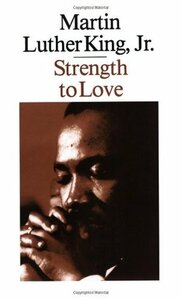You need to sign in or sign up before continuing.
Take a photo of a barcode or cover
informative
challenging
emotional
hopeful
reflective
fast-paced
How does this world remember MLK? Most remember him for his “I Have a Dream” speech, walking in Selma, the passage of the Civil Rights Act, or his stay in the Birmingham Jail. This book does a phenomenal job to show that, while those accomplishments deserve him a high seat of respectability in the world’s consciousness, all of his actions were backed by careful considerations of faith and philosophy every step of the way.
In many ways MLK was the complete antithesis of who the majority of White Americans in the South thought of when they considered their Black neighbors. He was well-studied, thoroughly reflected, perfectly eloquent, humble, insightful, nuanced. These sermons so well placed in this book show that he not only kept these honorable attributes to himself, but also spoke in a way never doubting of his congregation’s intelligence. Few writers/speakers can use their words to elevate their audiences both through the conclusions of their arguments and the formulations they make to get there.
This collection of sermons is a necessity for anyone that would like to understand the philosophy behind the man we have heard so much about, it will likely even open your eyes to some influencing beliefs he maintained that today would be considered quite radical (contrary to popular beliefs about him). Of course, this book reminds us that MLK was and continues to be a radical figure. One that dares to upend unjust power structures and question the status-quo, all in service of, and while maintaining a reverence to, the greatest power in our world: love. How strong we must be to wield such a radical weapon.
In many ways MLK was the complete antithesis of who the majority of White Americans in the South thought of when they considered their Black neighbors. He was well-studied, thoroughly reflected, perfectly eloquent, humble, insightful, nuanced. These sermons so well placed in this book show that he not only kept these honorable attributes to himself, but also spoke in a way never doubting of his congregation’s intelligence. Few writers/speakers can use their words to elevate their audiences both through the conclusions of their arguments and the formulations they make to get there.
This collection of sermons is a necessity for anyone that would like to understand the philosophy behind the man we have heard so much about, it will likely even open your eyes to some influencing beliefs he maintained that today would be considered quite radical (contrary to popular beliefs about him). Of course, this book reminds us that MLK was and continues to be a radical figure. One that dares to upend unjust power structures and question the status-quo, all in service of, and while maintaining a reverence to, the greatest power in our world: love. How strong we must be to wield such a radical weapon.
I found this book of King's sermons to be very moving. I started thinking about reading it because of the whole tiff-taff over the fake King quote circulating on Twitter after the OBL assassination. (Despite not being a direct quote from King, it certainly expressed a sentiment consistent with his philosophy, and was more or less a paraphrase of a passage in this book.)
Before reading StL, I was of course familiar with King in a cultural sense and had read a couple of his writings such as "Letter from Birmingham Jail," but none of his more intellectual or religious work. If you are the same way, I would urge you to read StL, particularly if you consider yourself a Christian. It evinces a depth of intellectual engagement (both theological and philosophical) that adds a lot of perspective to the work King did in the world.
One intellectual concept that particularly stuck with me, which King actually attributes to someone else (Harry Emerson Fosdick, for those of you keeping score at home), is the distinction between enforceable and unenforceable obligations, which he discusses in the context of the story of the Good Samaritan. Unenforceable obligations, writes King, "concern inner attitudes, genuine person-to-person relations, and expressions of compassion which law books cannot regulate and jails cannot rectify" (37). The story of the Good Samaritan is significant because of his commitment to unenforceable obligations. (King, obviously, also cared a great deal about enforceable obligations!) I feel like discussion of unenforceable obligations is largely missing in modern political discourse, and that's part of why I find significance in reading King, Teddy Roosevelt, Stanley Hauerwas, and others who pay attention to virtue.
Before reading StL, I was of course familiar with King in a cultural sense and had read a couple of his writings such as "Letter from Birmingham Jail," but none of his more intellectual or religious work. If you are the same way, I would urge you to read StL, particularly if you consider yourself a Christian. It evinces a depth of intellectual engagement (both theological and philosophical) that adds a lot of perspective to the work King did in the world.
One intellectual concept that particularly stuck with me, which King actually attributes to someone else (Harry Emerson Fosdick, for those of you keeping score at home), is the distinction between enforceable and unenforceable obligations, which he discusses in the context of the story of the Good Samaritan. Unenforceable obligations, writes King, "concern inner attitudes, genuine person-to-person relations, and expressions of compassion which law books cannot regulate and jails cannot rectify" (37). The story of the Good Samaritan is significant because of his commitment to unenforceable obligations. (King, obviously, also cared a great deal about enforceable obligations!) I feel like discussion of unenforceable obligations is largely missing in modern political discourse, and that's part of why I find significance in reading King, Teddy Roosevelt, Stanley Hauerwas, and others who pay attention to virtue.
hopeful
informative
inspiring
reflective
medium-paced
hopeful
informative
inspiring
reflective
medium-paced
As resonant and relevant today as it was in 1963, this collection of sermons from the Reverend Dr. Martin Luther King Jr is a must read for anyone seeking to understand the struggles at the intersection of race, faith, and American culture. Today, MLK is often portrayed as a purveyor of neatly architected safe and approachable social platitudes. In truth, he was an unflinching truth teller who challenged those in power, his peers, and his supporters and congregants with intellectual and spiritual fervor. The concepts and declarations found in Strength to Love serve as a stark reminder that if King were to be preaching today, he would be met with the same ugly oppression and vitriol he endured 60 years ago. We have not come nearly as far as we would like to believe and still have quite a journey ahead to realize the kind of justice King envisioned for us.
I marked this as “read” yet I hope to never stop reading it, returning time after time.
"I can never be what I ought to be until you are what you ought to be, and you can never be what you ought to be until I am what I ought to be."
"Forgiveness is not an occasional act; it is a permanent attitude."
"Morality cannot be legislated, but behavior can be regulated."
"Forgiveness is not an occasional act; it is a permanent attitude."
"Morality cannot be legislated, but behavior can be regulated."
The sermons collected here are not just a time-capsule of non-violent civil resistance but are an encapsulation of poignant twentieth-century theological ethics. Worked out from the pulpit in conversation with the social-justice efforts of the people, this also serves as a profound homiletics. The sermon is not to be aloofly read, but as King says, is an "appeal to a listening congregation".






